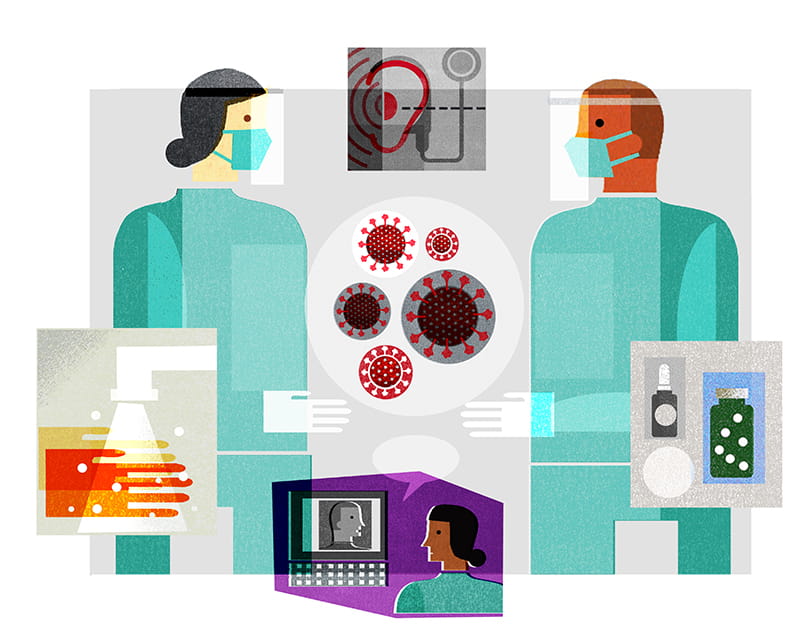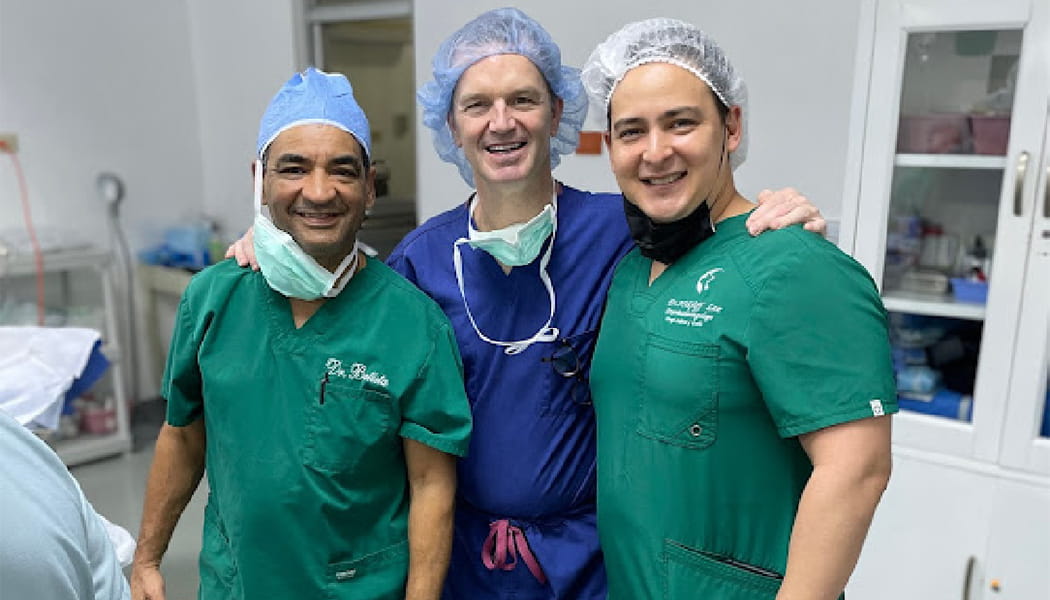
2020 Annual Report
 What began as a desire to complete a medical mission has evolved into an ongoing passion that’s helped roughly 1,300 people with ear, nose and throat conditions in the Dominican Republic – and positively changed the lives of many others here at home.
What began as a desire to complete a medical mission has evolved into an ongoing passion that’s helped roughly 1,300 people with ear, nose and throat conditions in the Dominican Republic – and positively changed the lives of many others here at home.
This passion belongs to Edward Dodson, MD, otologist in the Department of Otolaryngology – Head and Neck Surgery at The Ohio State University Wexner Medical Center, who took his first medical mission trip in 1995 as a fellow at the University of Virginia Health Sciences Center. His experience led him to return 45 times (and counting) and create Project Ear, a nonprofit organization dedicated to helping underserved people in developing nations with hearing loss and ear diseases.
The need for Project Ear in the Dominican Republic is great. More than 3.7 million of the country’s 11 million citizens are enrolled in the government’s subsidized insurance plan, but very few of these patients can receive the necessary care for hearing loss and ear pathologies due to the country’s lack of resources and inadequate physician training.
On Dr. Dodson’s first trip there in 1995, he, his mentor Paul Lambert, MD, and two other team members met Roberto Batista, MD, a local otolaryngologist who had just completed his residency. At Dr. Batista’s urging, Drs. Dodson and Lambert made him a deal: They’d continue returning to the Dominican Republic and would train Dr. Batista to perform otologic procedures, so long as he would screen patients prior to the trips and provide essential follow-up care to ensure the surgeries were successful.
“He was all in,” Dr. Dodson says. “And it worked great.”
In the beginning, Dr. Lambert and Dr. Dodson returned to the Dominican Republic annually. But once Dr. Dodson began managing the medical mission trips, he started traveling there a few times a year. By 2000, Project Ear was born.
Today, Dr. Dodson takes 12 or 13 colleagues on each trip to Centro Christiano de Servicios Medicos, the mission hospital in Los Alcarrizos. His teams often include specialists from across the Wexner Medical Center health system, including otologists and otology fellows, audiologists, anesthesia faculty, nurses and many residents and medical students. In all, more than 100 Ohio State staff members have contributed their expertise to Project Ear and the people of the Dominican Republic, with many returning several times.
What often impresses team members the most – and keeps many going back – is the gratitude expressed by the patients and providers in the Dominican Republic.
“It’s eye-opening,” says Jeannette Elum, assistant administrator of the Department of Otolaryngology – Head and Neck Surgery, who made her first trip this March. “It was just amazing to see what people are grateful and thankful for.”
With no medical education, Elum was concerned she wouldn’t be useful on the trip. But she was busy from dawn to dusk doing administrative tasks, disinfecting equipment and assisting the surgical scrub techs after receiving on-site training.
“It was honestly the best experience of my life,” she says.
Fifth-year otolaryngology resident Akash Naik, MD, was also humbled by the experience. During the trip, Dr. Naik had the opportunity to participate in numerous otologic surgeries at the mission hospital in Los Alcarizzos as well as head and neck surgeries at Hospital Salvador B. Gautier with the faculty and ENT residents from the Dominican otolaryngology training program. He was also on hand to present two donated, flexible laryngoscopes to local residents and faculty members.
“Witnessing the pure joy, excitement and gratitude for equipment that I’ve often taken for granted was very humbling,” he says. “It truly made me appreciate all the resources and opportunities at our disposal here in the U.S.”
Chronic otitis media and congenital ear disease make up the majority of cases the team treats, but several of Dr. Dodson’s colleagues have joined him and performed complex upper airway surgeries and plastic surgeries for devastating traumatic injuries. On their most recent trip in March, the team completed 35 such surgeries.
Donations make everything possible. Dr. Dodson obtains durable medical equipment from health care companies and retiring physicians, and operating room personnel collect disposable supplies, such as surgical drapes, gowns, syringes and gauze from supply packs that don’t get fully utilized during surgeries here in the United States. Dr. Dodson collects the items, resterilizes them and repackages them himself.
“Project Ear is bigger than just the people who go on the trips,” he says. “I’m very thankful for all the nurses and OR staff who gather these supplies for us.”
Helping the underserved is what drew Dr. Dodson to this work. And that remains a driving force of his efforts today.
“We’re helping patients who otherwise wouldn’t get the care that we’re able to provide,” he says.
But in recent years, Project Ear has expanded its focus to help educate otolaryngology residents who are training at Hospital Salvador B. Gautier. Several of those residents have even traveled to the Ohio State Wexner Medical Center to observe care and hone their skills in the department’s state-of-the-art temporal bone laboratory.
The program has made a real difference in the lives of the country’s citizens and its medical staff, but they aren’t the only ones to benefit. Project Ear team members do, too.
“It changes you,” Dr. Dodson says of making a trip. “You come back a different person.”
It’s common for people to gain new perspective on things they take for granted and new appreciation for what really matters in life. What’s more, team members bond with their colleagues and get to know each other on a more personal level.
“That makes for a friendlier and more efficient work environment when you get back home,” Dr. Dodson says.
Realizing that educational opportunities here are gifts and using them to provide excellent patient care is a key message Dr. Dodson hopes all Project Ear participants take away from their experience. But he also has another message, one that’s pertinent to everyone, regardless of profession.
“Be passionate about something,” he says. “It may not be humanitarian mission work that excites you, but all of us should strive to make the world a better place.” Learn more about Project Ear and how you can support the program.